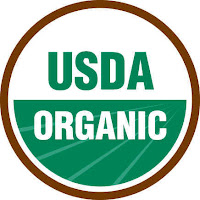
There are many reasons to eat organic, ranging from the preservation of our environment to the health benefits associated with natural growing practices. In fact, one of the best ways to experience the energetic nature of food is to eat it in its pure and natural state. If you've ever eaten organic food, you probably noticed that it tasted fresher and more flavorful, the colors are often more vibrant and the food itself is void of the waxy texture that is created by the use of harmful chemicals.
It's important to take into consideration that in the grocery store organic food is generally more expensive than conventionally grown food. If you're shopping on a tight budget, spend your money on fresh organic fruits and vegetables, and more specifically, the fruits and vegetables that don't have a peel or can't be peeled like strawberries, blueberries, grapes, raspberries, blackberries, peppers, herbs (cilantro, parsley, rosemary), lettuce, etc...
Also, take the time to read labels. If you're not buying organic, it's important to make sure that what you are eating is safe. Stay away from processed foods and foods with a high level of preservatives, and make sure you can not only pronounce everything that is on the label, but also recognize that food source as an actual food source. Example: MSG Monosodium Glutamate. It doesn't grow on a tree, or in the ground, but rather created in a lab and has been shown to increase the occurrence of asthma in those that are sensitive to the substance.
Here are just a few reasons why we should eat more organic...
Organic farming puts less strain on wildlife and the environment; these methods result in less air, water, and land pollution and produce less global warming gases.
The President's Cancer Panel suggests consuming organic food to avoid pesticides which have been linked to several types of cancers.
Organic standards prohibit the practice of genetically modifying crops and ingredients.
Organic food is void of harmful food additives, flavor enhancers, artificial sweeteners (i.e. aspartame and high-fructose corn syrup), contaminants (i.e. mercury) or preservatives, that have been linked to a multitude of health problems.
If you choose to consume animal products, be aware that organic farming standards prohibit the use of growth hormones, antibiotics, and genetically modified vaccines in farm animals. In addition, organic meat and dairy with the labels "free range" and "pasture fed" means that the animals were treated in a more humane and ethical manner.
Although studies have been performed that have yielded mixed results, it has been shown that organic fruits and vegetables contain up to 40% more antioxidants than conventional produce.

No comments:
Post a Comment